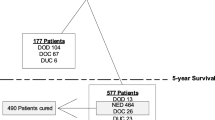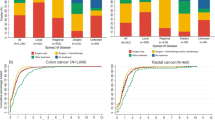Abstract
Background
Colorectal cancer survival has increased in recent years, however, the impact of these cancers and their treatment on long-term survivors has not been extensively investigated at the population level. This pilot study assessed the prevalence of late outcomes in long-term colorectal cancer survivors registered by two European population-based cancer registries (CRs) to determine the feasibility of using the approach on a wider basis in Europe.
Methods
Long-term survivors diagnosed in 1990 and in 1997 in Côte d’Or (France) and Varese (Italy) CRs were surveyed. Questionnaires to general practitioners (GPs) and survivors investigated a wide range of outcomes. Information on stage at diagnosis, primary treatment, stoma inserted during main surgery, and vital status was available from a previous study. Logistic regression was used to identify associations of late outcomes with sex, age at survey, country, year of diagnosis, and site.
Results
Participation was 51.8% (45.2% of French and 56.6% of Italian cases identified). Of the 256 survivors available for analysis, 10% had bowel incontinence, about 70% had other bowel, gastrointestinal, or urination problems, 10% had second primary cancer, 4% had colorectal recurrence, and 10% had stoma. The proportion with stoma reduced by 65% in survivors diagnosed between 1990 and 1997, but no other outcomes reduced in prevalence with time. Most (67%) had optimal GP-assessed ECOG performance status. Around 80% were followed-up with liver imaging or colonoscopy.
Conclusions
We identified non-trivial rates of bowel and bladder problems after colorectal treatment, but overall good levels of functioning. High-resolution studies of this kind must be population-based to provide data useful for public health provision. This pilot study encountered difficulties in contacting GPs and suffered from low compliance. However, it is the first to investigate late outcome trends after treatment for colorectal cancer.
Similar content being viewed by others
References
Boyle P, Ferlay J. Cancer incidence and mortality in Europe, 2004. Ann Oncol. 2005;16(3):481–8.
Roazzi P, Capocaccia R, Santaquilani M, Carrani E. Electronic availability of EUROCARE-3 data: a tool for further analysis. Ann Oncol. 2003;14(Suppl 5):v150–5.
Faivre-Finn C, Bouvier-Benhamiche AM, Phelip JM, Manfredi S, Dancourt V, Faivre J. Colon cancer in France: evidence for improvement in management and survival. Gut. 2002;51(1):60–4.
Micheli A, Mugno E, Krogh V, Quinn MJ, Coleman MP, Hakulinen T, Gatta G, Berrino F, Capocaccia R, and the EUROPREVAL Working Group. Cancer prevalence in European registry areas. Ann Oncol. 2002;13:840–65.
Oken MM, Creech RH, Tormey DC, Horton J, Davis,TE, McFadden ET, Carbone PP. Toxicity and response criteria of the Eastern Cooperative Oncology Group. Am J Clin Oncol. 1982;5:649–55.
Gatta G, Capocaccia R, Sant M, Bell CMJ, Coebergh JWW, Damhuis RAM, et al. Understanding variations in colorectal cancer survival in Europe: a EUROCARE high-resolution study. Gut. 2000;47:533–8.
World Health Organisation. International Classification of Diseases, 1975, 9th edition. Geneva: WHO; 1997.
P. Hermanek, LH Sobin (eds). TNM Classification of Malignant Tumours, Fourth Edition, 2nd Revision 1992. UICC, International Union Against Cancer, Springer.
Sprangers MA, te Velde A, Aaronson NK. The construction and testing of the EORTC colorectal cancer-specific quality of life questionnaire module (QLQ-CR38). European Organization for Research and Treatment of Cancer Study Group on Quality of Life. Eur J Cancer. 1999;35(2):238–47.
StataCorp. Stata Statistical Software: Release 7.0. College Station, TX: Stata Corporation; 2001.
Trentham-Dietz A, et al. Health-related quality of life in female long-term colorectal cancer survivors. The Oncologist. 2003;8:342–9.
Ramsey DS, et al. Quality of life in survivors of colorectal carcinoma. Cancer. 2000;88(6):1294–303.
Ramsey DS, et al. Quality of life in long term survivors of colorectal cancer. Am J Gastroenterol. 2002;97(5):1228–34.
Kirwan WO, O’Riordain MG, Waldron R. Declining indications for abdominoperineal resections. Br J Surg. 1989;76:1061–3.
Finn-Faivre C, Maurel J, Benhamiche AM, Herbert C, Mitry E, Launoy G, Faivre J. Evidence of improving survival of patients with rectal cancer in France: a population based study. Gut. 1999;44:377–81.
Pollack J, Holm T, Cedermark B, Holmstrom B, Mellgren A. Long-term effect of preoperative radiation therapy on anorectal function. Dis Colon Rectum. 2006;49(3):345–52.
Lundby L, Krogh K, Jensen VJ, Gandrup P, Qvist N, Overgaard J, Laurberg S. Long-term anorectal dysfunction after postoperative radiotherapy for rectal cancer. Dis Colon Rectum. 2005;48(7):1343–9.
Manfredi S, Bouvier AM, Lepage C, Hatem C, Dancourt V, Faivre J. Incidence and patterns of recurrence after resection for cure of colonic cancer in a well defined population. Br J Surg. 2006;93(9):1115–22.
Gatta G, Capocaccia R, Berrino F, Ruzza M, Contiero P, and the EUROPREVAL Working Group. Colon cancer prevalence and estimation of differing care needs of colon cancer patients. Ann Oncol. 2004;15(7):1136–42.
Yabroff KR, Lawrence WF, Clauser S, Davis WW, Brown ML. Burden of illness in cancer survivors: findings from a population-based national sample. J Natl Cancer Inst. 2004;96(17):1322–30.
McCredie M, Macfarlane GJ, Bell J, Coates M. Second primary cancers after cancer of the colon and rectum in New South Wales, Australia, 1972–1991. Cancer Epidemiol Biomarkers Prev. 1997;6(3):155–60.
Hoar SK, Wilson J, Blot WJ, McLaughlin JK, Winn DM, Kantor AF. Second cancer following cancer of the digestive system in Connecticut, 1935–82. Natl Cancer Inst Monogr. 1985;68:49–82.
Enblad P, Adami HO, Glimelius B, Krusemo U, Påhlman L. The risk of subsequent primary malignant diseases after cancers of the colon and rectum. Cancer. 1990;65:2091–100.
Burt RW. Familial risk and colorectal cancer. Gastroenterol Clin North Am. 1996;25(4):793–803.
Renehan AG, Egger M, Saunders MP, O’Dwyer ST. Impact on survival of intensive follow up after curative resection for colorectal cancer: systematic review and meta-analysis of randomised trials. BMJ. 2002;324(7341):813.
NIH Consensus Conference. Adjuvant therapy for patients with colon and rectal cancer. JAMA. 1990;264:1444–50.
Acknowledgements
We thank Don Ward for help with the English and Samba Sowe for editorial support. We also thank Ivana Marcatto and Maria Rosa Ruzza for tracing GPs and patients and managing contacts. We extend a special thanks to all GPs and patients who participated. The study was supported by the European Federation of Cancer Societies (FECS), the EUROCARE-3 BIOMED-2 Program, Contract No. BMH4-CT98-3390, and the Compagnia di San Paolo, Torino, Italy.
Author information
Authors and Affiliations
Corresponding author
Rights and permissions
About this article
Cite this article
Gatta, G., Ciccolallo, L., Faivre, J. et al. Late outcomes of colorectal cancer treatment: a FECS-EUROCARE study. J Cancer Surviv 1, 247–254 (2007). https://doi.org/10.1007/s11764-007-0030-1
Received:
Accepted:
Published:
Issue Date:
DOI: https://doi.org/10.1007/s11764-007-0030-1




